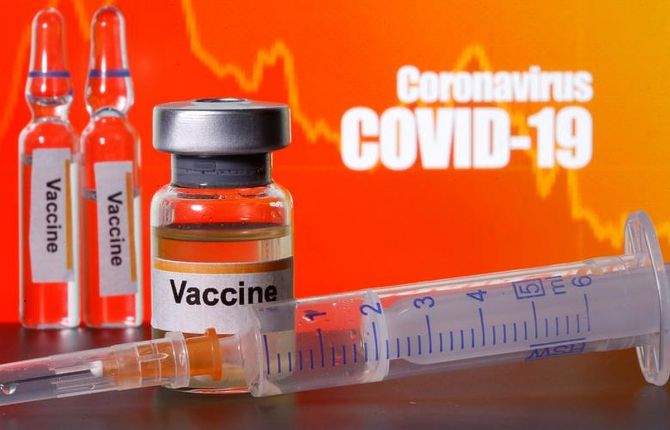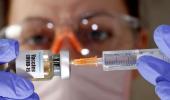Three COVID-19 vaccines, developed by Bharat Biotech, Serum Institute of India and Pfizer, are under active consideration of India's drug regulator and there is hope that early licensure is possible for all or any of them, the Union health ministry said on Tuesday.

Over the last four days, the Indian arm of US pharmaceutical giant Pfizer, Pune-based Serum Institute of India and Hyderabad-based pharmaceutical firm Bharat Biotech have applied to the Drugs Controller General of India seeking emergency use authorisation for their COVID-19 vaccines.
At a press briefing, NITI Aayog member (Health) V K Paul said the COVID-19 situation in India has stabilised.
With active cases reducing, a "clear-cut declining trend" in the pandemic is being seen even though the situation in many other countries is becoming quite serious, he said.
The concern and anxiety following an increase in daily cases of infection in Delhi also looks like to have settled, Paul added.
Asked what steps would be followed by the DCGI in the absence of a water-tight emergency use authorisation law for granting licence to vaccine makers, Union Health Secretary Rajesh Bhushan said not all countries' regulatory framework or rules and acts mention emergency use authorisation.
"So, the fact that this phrase is not used in the national regulatory framework of any country does not mean that a specific country would not have an enabling provision to accord an approval which is early and distinct from a regular market approval.
"India's regulatory framework has a specific provision for grant of emergency use authorisation, although this phrase is not used," he said.
The New Drugs and Clinical Trials Rules, 2019, clearly specifies that under specific special situations, relaxation, abbreviation, omission, or deferment of data including local clinical trial data may be considered for approval.
"This is our law. Similarly, other countries too have their laws," Bhushan said.
Giving a bird's-eye view of the Indian landscape of COVID-19 vaccines, Bhushan mentioned that eight vaccines are at different stages of development.
One is Covishield, manufactured by Serum Institute of India in collaboration with AstraZeneca. Phase two and three clinical trials of this vaccine is underway and the firm has applied for emergency use authorisation.
Another is Covaxin, which is being indigenously developed by Bharat Biotech in collaboration with the Indian Council of Medical Research and is in phase three of clinical trials. It has also applied for emergency use authorisation.
The third one is ZyCOV-D, being developed by Cadila Healthcare Ltd in Ahmedabad in collaboration with the Centre's Department of Biotechnology and is in phase two of the trials.
The fourth vaccine candidate is Sputnik V which is being manufactured by Dr Reddy's Lab, Hyderabad, in collaboration with Russia's Gamaleya National Centre. The phase two trial in India is over and phase three will begin next week.
The fifth one is NVX-CoV2373, which is being developed by Serum Institute of India in collaboration with Novavax and its phase three clinical trial is under consideration with the drug regulator.
The sixth vaccine candidate is Recombinant Protein Antigen-based vaccine, to be manufactured by Biological E Ltd, Hyderabad, in collaboration with MIT, USA.
Its pre-clinical animal studies have concluded and phase one and two human clinical trials have started. Another one is HGCO 19, being manufactured by Genova in Pune in collaboration with HDT, USA. Its pre-clinical animal studies are over and phase one and two clinical trials is set to start.
The eighth vaccine is being developed by Bharat Biotech International Ltd in collaboration with Thomas Jefferson University, USA and it is at the pre-clinical stages.
"Another vaccine, which is in the initial stage, is being developed by Aurbindo Pharma. So, there are nine vaccines out of which six are in clinical trials and three are in pre-clinical stage," Bhushan said.
"There are multiple vaccine candidates in different stages of development and some may get licensed in the next few weeks. But we cannot foretell at this moment because licensure or market authorization is the domain of the national regulator."
Most of the vaccines are of two or three doses to be administered three to four weeks apart. However, even after vaccination, COVID precautions must be taken and this has been advised by WHO also, Bhushan said, adding, "Vaccination does not mean people become carefree."
About cold chain infrastructure augmentation, the health secretary said presently the system consists of 85,634 equipment for storage of vaccine at about 28,947 cold chain points across the country.
"Current cold chain is capable of storing additional quantity of COVID-19 vaccine required for first the three crore -- healthcare and frontline workers," he said, adding states have collected data of frontline healthcare workers who would get the shots.
The data is being uploaded on Co-WIN software, Bhushan said.
The ministry, in consultation with states, has assessed the additional requirement for cold chain storage and the first supply of such additional equipment would begin from December 10, the health secretary said.
Bhushan said that while 2.38 lakh auxiliary nurse midwives help in vaccination under universal immunisation programme, only 1.54 lakh such health workers will be used for COVID-19 inoculation.
Additional vaccinators are being arranged in collaboration with states and UTs, he added.











 © 2025
© 2025